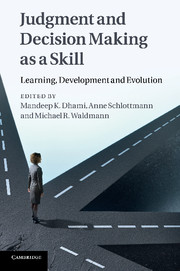Book contents
- Frontmatter
- Contents
- Figures
- Contributors
- Preface
- Acknowledgments
- Chapter cross-reference table
- Part I Evolutionary and neural bases of JDM
- 1 The evolved foundations of decision making
- 2 Neural bases of judgment and decision making
- Part II Developmental approaches to JDM
- Part III Learning JDM
- Part IV Improving and aiding JDM
- Conclusion
- Index
- References
2 - Neural bases of judgment and decision making
Published online by Cambridge University Press: 05 December 2011
- Frontmatter
- Contents
- Figures
- Contributors
- Preface
- Acknowledgments
- Chapter cross-reference table
- Part I Evolutionary and neural bases of JDM
- 1 The evolved foundations of decision making
- 2 Neural bases of judgment and decision making
- Part II Developmental approaches to JDM
- Part III Learning JDM
- Part IV Improving and aiding JDM
- Conclusion
- Index
- References
Summary
Introduction
Humans are naturally inclined to seek explanations of behavior. Due to recent technical and theoretical advances, neuroscience has begun to elucidate the material causes of human behavior, including judgment and decision making. Material-cause explanations focus on the substrates that comprise or give rise to a phenomenon (Aristotle, 1929; Killeen, 2001), and in the present chapter we focus on recent studies examining the neural substrates of human judgment and decision making. Specifically, we review evidence from brain imaging literature to assess the contribution of neuroscience to understanding judgment and decision making in four areas: (a) decision making under risk; (b) base-rate neglect in probability judgment under conditions of uncertainty; (c) belief bias – namely, the biasing effect of personal knowledge on epistemic judgments; and (d) decision making in the social context of two-party economic exchange games. Within each area we will focus on studies in which this methodology has been applied to address theoretically important questions, enabling us to evaluate the contribution of findings to our understanding of the causal origins of judgment and decision making.
Generally speaking, neuroscientific explanations of psychological phenomena have taken the form of investigating the involvement of various brain structures that underlie behaviors of interest. However, cognitive and social neuroscientists are less interested in human brain mapping per se than they are in understanding the underlying processes and mechanisms that are represented by the involvement of the activated brain structures (Poldrack, 2006). This is because when knowledge about brain function is combined with standard forms of behavioral evidence, inferences about underlying psychological processes and mechanisms may be augmented. The extent to which satisfactory explanations can be provided is in turn a function of the ability of the available techniques (and related theories) to pinpoint with specificity the processes and mechanisms associated with the regions of interest. Although specificity can have multiple connotations in the context of neuroimaging, here we will focus on functional specificity, and address its effect on generating accounts of behavior.
- Type
- Chapter
- Information
- Judgment and Decision Making as a SkillLearning, Development and Evolution, pp. 29 - 52Publisher: Cambridge University PressPrint publication year: 2011
References
- 4
- Cited by



